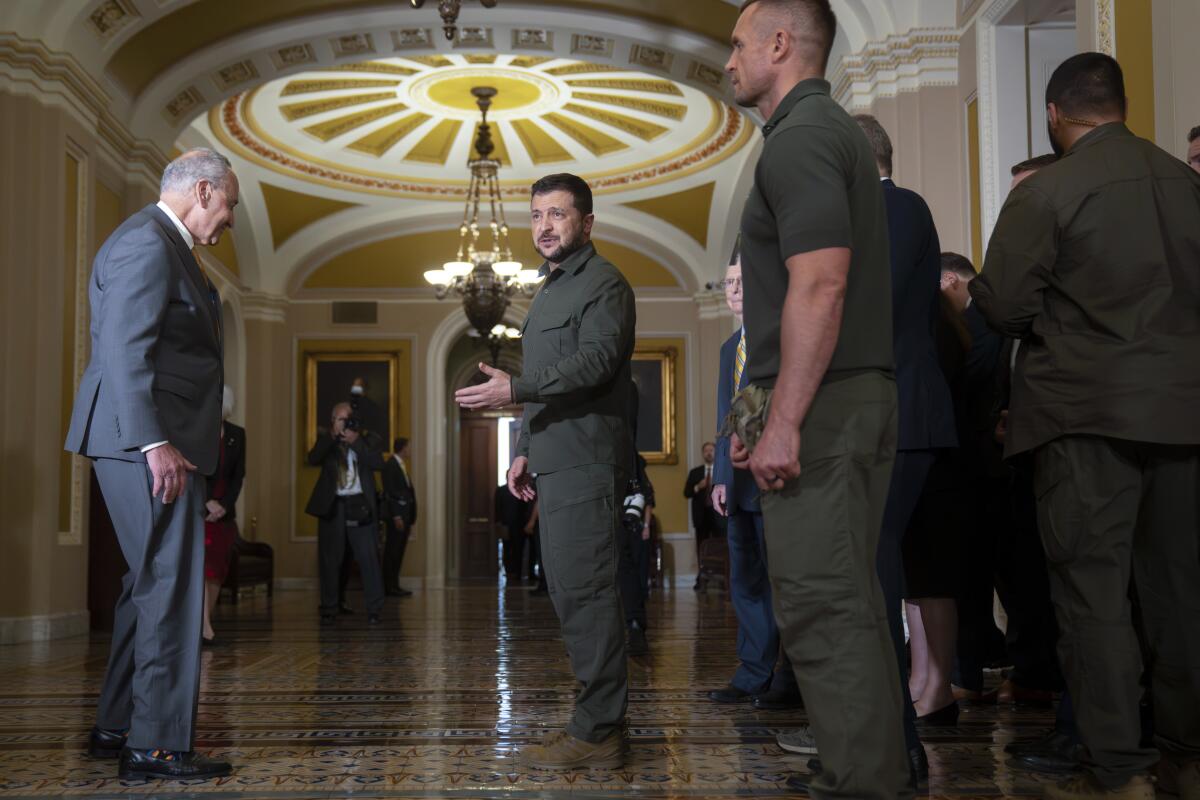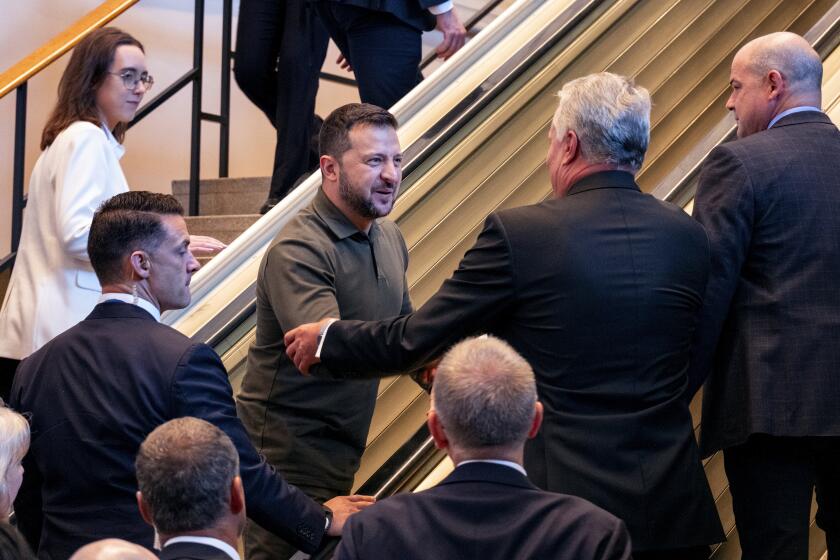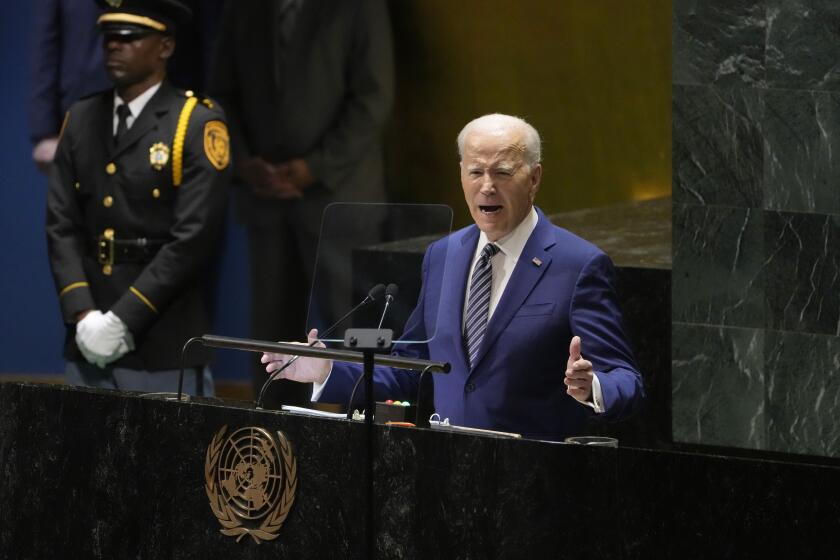Zelensky, in Washington, tries to convince Republicans to keep backing military aid for Ukraine

- Share via
WASHINGTON — Ukrainian President Volodymyr Zelensky came to Washington on Thursday with a problem to solve.
A year and a half after Russia invaded Ukraine, once-bipartisan support for U.S. military funding for the embattled nation has evaporated.
Seventy-one percent of Republicans — along with 55% of independents but just 38% of Democrats — said Congress should not authorize additional funding for the war, according to a July CNN poll.
Some GOP members have followed their constituents’ lead. In August, 70 House Republicans, nearly a third of the caucus, voted for an amendment that would have cut off all U.S. aid to Ukraine. Rep. Doug LaMalfa of Richvale was the sole California Republican to vote for the measure, which failed after Democrats joined with the majority of the House GOP to kill it.
Zelensky, fresh from a visit to the United Nations General Assembly in New York City, arrived at the Capitol on Thursday under heavy security. His top priority: Make sure the number of Republicans unwilling to continue funding the war effort doesn’t get any bigger.
A meeting with House Speaker Kevin McCarthy (R-Bakersfield), who’s also facing a looming government shutdown and a potential leadership coup by far-right members of his caucus, was first on the Ukrainian leader’s agenda. The meeting was attended by committee and party leaders, including House Minority Leader Hakeem Jeffries (D-N.Y.). Zelensky later met with senators behind closed doors.
McCarthy declined Zelensky’s request to address a joint session of Congress, saying there was not enough time. He also reportedly declined a White House offer to give House lawmakers the same classified briefing the Senate received this week.
Asked by reporters about the meeting, McCarthy said only that “it was good.” After the meeting, McCarthy bolted to wrangle far-right members to back legislation to advance Pentagon funding. The measure failed in a floor vote, only adding to the list of McCarthy’s problems as the federal government barrels toward a shutdown.
Senate Minority Leader Mitch McConnell (R-Ky.) was more enthusiastic after his meeting with Zelensky.
“American support for Ukraine is not charity,” he said after meeting with Zelensky. “It’s an investment in our own direct interest — not least because degrading Russia’s military power helps to deter our primary strategic adversary: China.”
Zelensky emphasized Ukraine’s gratitude for U.S. assistance — and expressed thanks to “both parties” in a tweet Thursday afternoon. “We have accomplished much together to safeguard democracy, freedom, and dignity—values shared by both of our nations,” he added.
Even some of Kyiv’s close allies have grumbled that it doesn’t seem sufficiently grateful for the aid it’s received. How thankful is thankful enough?
Many of California’s Republican House members are in a particularly difficult position. Of the 18 Republicans who hold districts President Biden won in 2020, five — nearly a third — are in California. If they continue to back the war effort, they could alienate the GOP base in their districts. But voting against Ukraine aid, which Democrats still support, could limit their crossover appeal.
Peter Harris, a political scientist at Colorado State University, told The Times that some Republicans oppose approving funding because they believe the United States should be more focused on defeating another world power: China. Harris also predicted that support for Ukraine will probably continue to wane as the war drags on.
“I wouldn’t be surprised if a pretty sizable faction within the Republican Party came to the determination that it would be politically prudent to end the war rather than supporting Ukraine,” Harris said.
Some Republicans vying for the White House have already made that call. During the August GOP primary debate, Florida Gov. Ron DeSantis and tech entrepreneur Vivek Ramaswamy both said they would stop aid to Ukraine if elected president.
“It’s not unusual for the opposition party to be skeptical of an administration’s policies,” Alex Conant, a Republican strategist, told The Times.
Democrats were the first to critique then-President George W. Bush over the war in Iraq and now some Republicans are doing the same of Biden over his strategy for Ukraine, Conant argued.
“They’re the opposition so they’re not invested in his policies,” he said.
Conant added that there is a small but growing number of Republicans who are “very skeptical of foreign interventions” and that a “small faction can cause big problems.” Still, a majority of the GOP backs sending military aid, notably in the Senate.
Though support for the war has also slipped among Democratic voters since the invasion, Democratic lawmakers remain overwhelmingly supportive of approving military aid.
In an interview with The Times, Rep. Jimmy Gomez (D-Los Angeles) said that “when there is contention within any political party people try to distinguish themselves from one another,” noting that many Republicans on the intelligence committee understand the stakes: If American military aid stops, it will make the war even more challenging for Ukrainians.
Propaganda pushed out by the Kremlin is successfully convincing many voters that the United States should not be in Ukraine — and some Republicans are gleefully repeating that propaganda, Gomez argued. Congress must “send a loud message... across the globe that we stand by our friends and we’re not going to let them get taken over by a rogue country,” he said.
At the United Nations, Biden and Zelensky sought to convince developing nations weary of a protracted fight in Ukraine to continue global support for Kyiv.
“The role of the United States and its stature around the globe relies on us following through on our word,” Gomez added. “And if we allow a country like Russia to invade another country, it might create a willingness of other countries to take action through military might.”
Zelensky left the Capitol before noon and traveled to the Pentagon to meet with U.S. Secretary of Defense Lloyd J. Austin III. Zelensky is expected to meet with President Biden at the White House on Thursday afternoon.
In a news conference, White House national security advisor Jake Sullivan said that Biden would announce a “new package of military assistance” that would “include significant air defense capabilities to help Ukraine protect its people.” The assistance would also include weapons and equipment to enable the beleaguered nation to “maintain its momentum in the counter offensive.”
“These capabilities will help Ukraine harden its defenses ahead of what is likely to be a tough winter filled with renewed Russian attacks on Ukrainian critical infrastructure,” he said.
The Pentagon is opting not to send ATACMs long-range missiles to Ukraine but Biden “has not taken it off the table” in the future.
Hours before Zelensky met with McCarthy, Ukraine was hit with the biggest barrage of Russian missiles in more than a month.
Overnight, 43 Russian cruise missiles struck cities from east to west including the capital, Kyiv; the country’s second-largest city, Kharkiv, close to the Russian border; and Lviv, near the Polish frontier. Ukraine’s military said 36 of the projectiles were shot down, including 20 over Kyiv.
Over a period of hours lasting until early morning, the repeated blare of air alarms sent people scrambling for shelter, many with small children and pets in tow. In Kyiv, falling debris damaged several buildings and left at least four people injured. Zelensky made grim note of the wave of strikes, writing in a post on the messaging app Telegram that air defense is “among the top issues” as he seeks to win congressional support for more aid.
Times staff writers Courtney Subramanian contributed to this report from Washington and Laura King from Kyiv.
More to Read
Get the L.A. Times Politics newsletter
Deeply reported insights into legislation, politics and policy from Sacramento, Washington and beyond. In your inbox three times per week.
You may occasionally receive promotional content from the Los Angeles Times.













